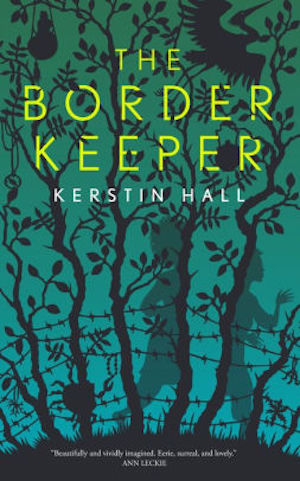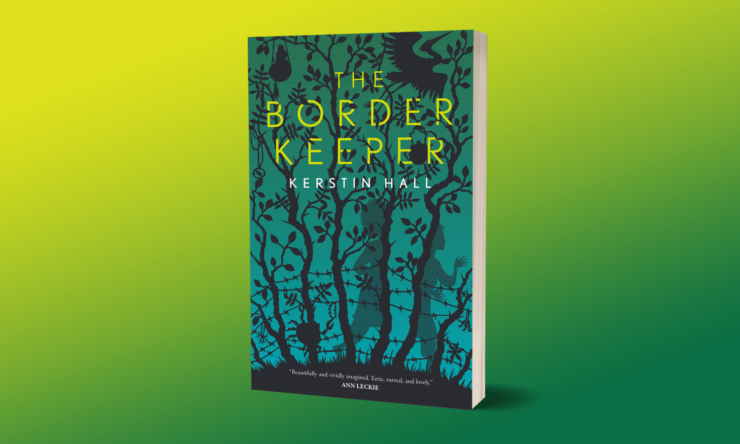Vasethe is a mysterious young man on a journey into the proverbial underworld, and like any other tourist, he needs a good guide: in this case, the destroyer of empires, mistress of the dead, and keeper of the border between Ahri and the 999 demonic realms of Mkalis. Vasethe just calls her Eris. And despite his obfuscation of his purposes in Mkalis, Eris agrees to help him. These journeys are always the same after all: to find a lost loved one, to bring them back to Ahri, to undo the grief and pain they feel at their passing. However, as they navigate the eerie creatures and antiquated rules and bureaucracy of Mkalis, the seams of Vasethe’s story start to come undone—just as Eris’ past rises up from the depths to seek justice upon her. In Kerstin Hall’s Border Keeper the characters are required by natural law to tell the truth, and yet no one is what they seem. Familiar mythology is turned on its head. And ruminations on grief and healing are whispered alongside a quest narrative that is at once traditional and anything but.
If this sounds like a lot for one little novella, it is. Hall’s economy of worldbuilding is nothing less than profound. The Border Keeper, even aside from its haunting prose and memorable characters, is a wonderful example of its form. It is short, sweet, and anything but shallow.
A huge piece of that successful worldbuilding is in The Border Keeper’s concise, recognizable mythology. The mythos of Hall’s world is influenced not insignificantly by Greek culture, but not limited by it either. Fairy/trickster logic, certainly, is at play: in Mkalis, demon rulers set restrictive laws that must be followed on pain of death. In the case of Buyak, in whose realm we spend much of the novella, one must tell the truth, or be wracked from the inside with physical pain (avoid figurative language at all costs). And of course there’s the age-old rule: don’t eat or drink in Mkalis, or you’ll be stuck there. The most significant and familiar myth at play, though, is the katabasis, or the hero’s trip into the underworld. Orpheus and Odysseus certainly fall in line, though Vasethe’s initial journey to find his old lover Raisha is most reminiscent of Dante’s quest to find Beatrice in the Inferno, with Eris as a far-creepier Vergil.
Buy the Book


The Border Keeper
These allusions do not, by any means, make for a referential story, or even for a simple retelling. If anything they provide a familiar lens that Hall then uses to distort every other image. There are of course plot twists that subvert readers’ expectations (I will not spoil them here), but more than anything the mythological backdrop serves to make the story uncanny. Things in Mkalis are familiar, but different. Characters don’t lie, but don’t tell the truth either. They’re dead, but also alive. Good, but perhaps also evil. The Border Keeper is simply creepy. It’s haunting and evocative, even beyond this toying with our expectations and comfort zones. Images like baby doll arms rattling in the wind, a child trapped inside of a crab, and creatures playing demonic symphonies on ghost ships fill the pages of the novella, every one of them surprising and vivid and a little bit terrifying. If Hall has built her world in familiar mythology, she has made that world interesting by turning it sideways and shaking it.
Like any good story about death and demons and crossing over, The Border Keeper deals heavily in grief. The novella depicts a reincarnation cycle, with souls moving between Ahri and Mkalis at the end of each lifespan, losing the memories of their previous life once they’ve become rooted in a new body. Despite knowing what comes after death, the people of Ahri and Mkalis are still devastated by it, still moved to great lengths to find their loved ones or to avenge them or to prolong their lives. Healing and justice become intergenerational projects, wounds stretching out over centuries. Vasethe’s story and Eris’ are both at the intersection of this grief, and together indicate something like hope. It his amazing how quickly and believably Hall builds the tender, trusting relationship between them.
The Border Keeper is both readable and re-readable. So much in the story is significant only in hindsight, and its imagery is just as surreal and unsettling the second time. The ending itself, while abrupt, felt earned. Hall could write a whole series in this world, and I’d read it—however, I love that this is a novella. Its compactness and its finely drawn characters make it a real delight to read and ruminate on.
The Border Keeper is available now from Tor.com Publishing.
Em Nordling reads, writes, and manages research in Louisville, KY.










